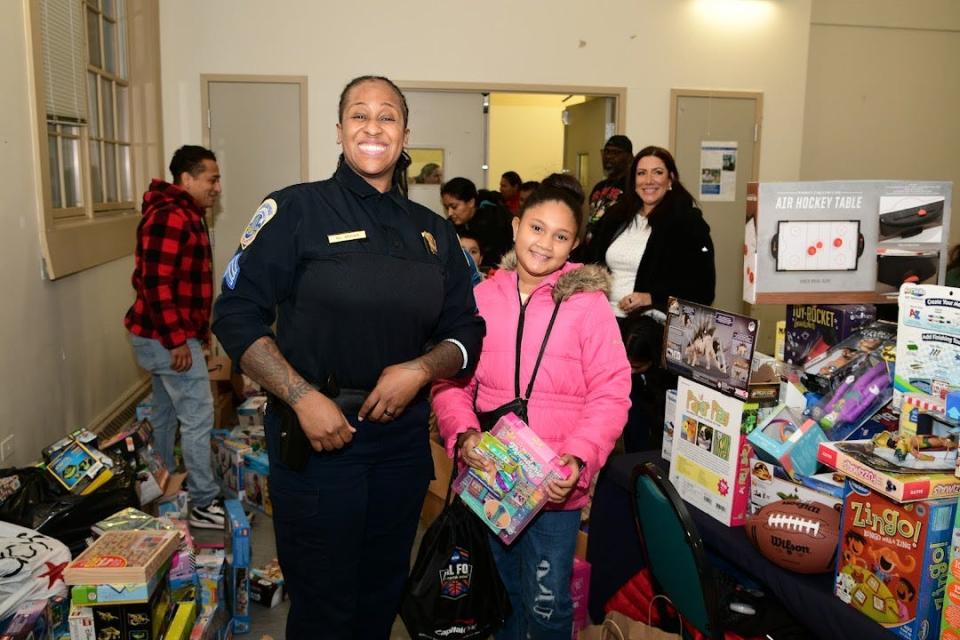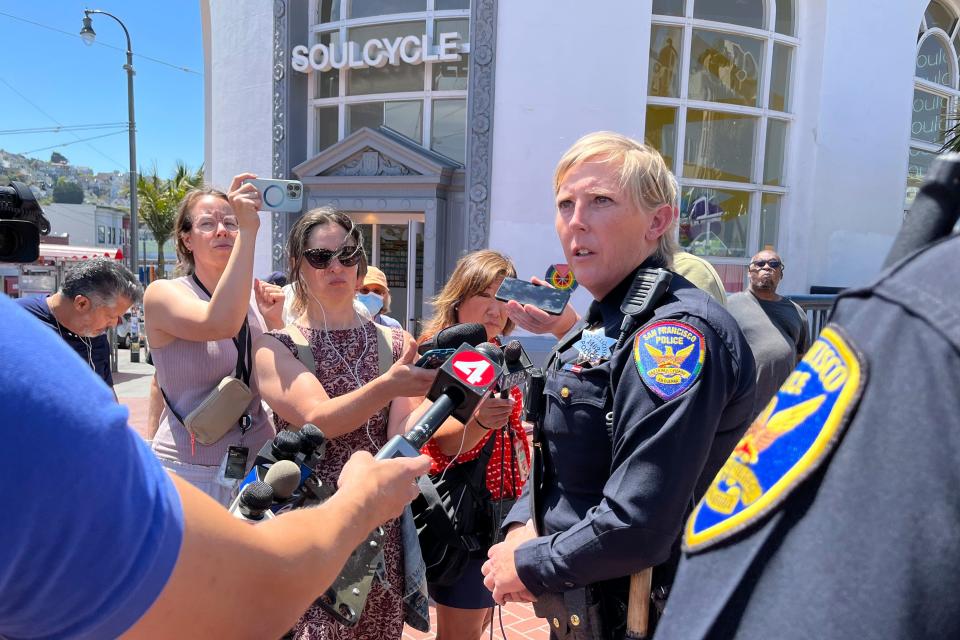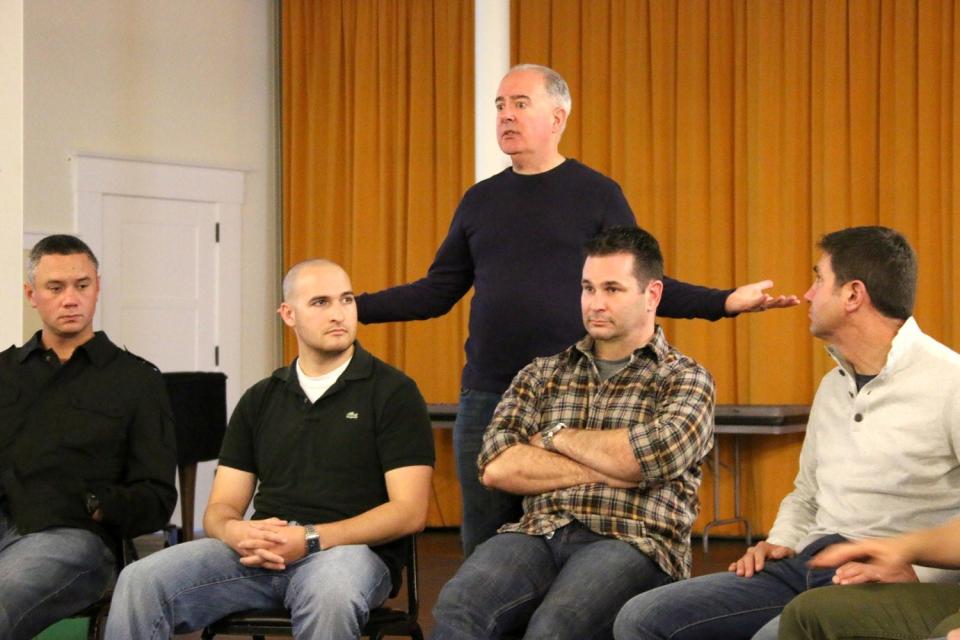LGBTQ, police relationship is fraught with violent history. Can department liaisons help?
When retired Officer Jim Ritter was hired by the Seattle Police Department in 1983, no one asked about his sexuality.
Ritter feared police departments wouldn't hire him because he's gay – a fear he said was exacerbated when two Seattle police officers led a failed effort to overturn protections for LGBTQ people in the late 1970s. After he was hired, he waited a decade before coming out, first telling his chief who was "supportive," then his squad, which was "accepting."
"He was the first on the department that I'd come out to because I realized we were in a new generation and this chief was progressive enough that it was safe to do that," Ritter said. "It was a good move on my part, but you're always apprehensive about coming out because you only got one chance to do it. Once you do it, there's no turning back."
In 2014, Ritter became the department's first full-time LGBTQ police liaison, an officer tasked with addressing the LGBTQ+ community's needs, mistrust of police and hate crimes. That year, Ritter established Safe Place, a program that allows community members to report hate crimes to certified local businesses.
A number of hate crimes and felony assaults during Pride weekend in Seattle went unreported until Safe Place was launched, he said.
"That was tangible proof to me that this was an effective initiative that can help the victims," Ritter said.
As anti-LGBTQ rhetoric, laws and violence surge across the country, a growing number of police departments have appointed liaisons in an attempt to repair the relationship between law enforcement and the queer community. But experts say liaisons and brief trainings can't address the needs of the community's most vulnerable members, including queer people of color and Black transgender people.
"The whole model of having a liaison doesn't quite make sense if the predominant issue is overpolicing queer people within racial minority communities," said Joseph Fischel, associate professor of women’s, gender, and sexuality studies at Yale University. "Workshops led by LGBT organizations on how to use the right pronouns and so on and so forth is kind of window dressing or rearranging the deck chairs on the Titanic."
Community outreach is 'critically important,' but liaisons are stretched thin
Ritter said attending community events, particularly Pride parades, is "critically important" to help bridge the gap in communication between the LGBTQ community and local law enforcement. The gap means 13% of LGBTQ people said they do not call the police even when they need help, according to a study from the Williams Institute at UCLA School of Law.
Still, police officers have been banned or restricted – by organizers of the events – from participating at Pride in Toronto, Washington, and New York in recent years with some in the community saying police shouldn't be in uniform at events that originated from the 1969 police raid at the Stonewall Inn.
"Not wanting them to march in the parade in support of this community seems to make no sense at all," Ritter said. "It's so destructive and it just turns the clock backward."
Nicole Brown, supervisor of the Metropolitan Police Department's LGBT Liaison Unit, said she attends between five and six events a week, which she said has helped build trust with residents and advocates before a crime occurs.
"Off of the strength of what this unit has done, you are able to be welcomed into these spaces with people who haven't always seen you as a beacon of safety," she said.

Police need to do more outreach within the transgender community, Brown acknowledged. She recalled spending time with an advocate reaching out to sex workers on the city's Eastern Avenue and said their primary needs – employment, health care, housing – can't be met by police.
"They feel like their house is on fire and we're ignoring it," she said. "If I'm being honest with you, that's one of the things we could do better going forward."
Some officers are stretched thin trying to balance community engagement with other responsibilities. Dorian Korieo, also part of a job demographic advisory council, is the department's Title II ADA coordinator and runs the community police academy.
"I essentially do three people's full-time jobs," Korieo said.
Kathryn Winters, who initially worked full time as an LGBTQ police liaison for the San Francisco Police Department, now also works with internal affairs and said her liaison duties have become "ancillary" because of staffing shortages.
"To be able to regularly meet with the community and really dedicate time to working with the community I think being a full time position would be ideal," Winters said.

Training, policies fall short of best practices
Police departments in New York City, Chicago, Houston and Philadelphia are among many that offer some form of training on interacting with LGBTQ individuals. Lawmakers in California and the attorney general in New Jersey recently made similar training mandatory.
Brown said recruits in Washington, D.C., get a short introductory training and can later apply for a in-depth, five-day training that includes field trips into community spaces.
"Those are my favorite two days," Brown said. "Then you get that real in-depth OJT, that on-the-job training. You take all of that, the training you can get in classroom and the field trip training, and you apply it to your time back in patrol."
While departments can collect feedback and anecdotal responses to these initiatives from officers, it can be difficult to gauge the impact training has on interactions with community members, said Greg Miraglia, founder of Out To Protect, which provides training to departments nationwide.

"That's yet to be determined," he said. "How we would measure that I'm not entirely certain, but I have to believe it's going to be beneficial."
Some departments have policies specifically addressing the needs of transgender, nonbinary and gender nonconforming people. But 60% of the country's 25 largest police departments lack any policies regarding correct use of names and pronouns, including those that specifically address transgender interactions, according to a 2019 study of from the National Center for Transgender Equality.
Departments need to do a better job of creating clear guidance on interacting with LGBTQ people and hold themselves accountable when mistakes are made, said Christy Mallory, legal director at the Williams Institute.
Nearly half of transgender people reported being uncomfortable seeking police assistance, according to a report from the National Center for Transgender Equality and the National Gay and Lesbian Task Force.
"It's not just about the trainings or appointing the officers, but ensuring that there are policies and practices in place for people to follow," Mallory said.
Addressing disparities requires more than trainings, liaisons
Despite the increased attention to the needs of the community, lesbian, gay, bisexual and queer people are still six times more likely than the general public to be stopped by police, according to a 2021 study from the Williams Institute.
The NCTE and NGLTF report found 1 in 5 trans people who have had police contact reported that they have been harassed by police, with much higher rates reported by people of color.
"There are some very significant differences within queer communities and their relationships with the police," Fischel said. "It actually really isn't an L issue or a B issue or even a G issue. It's just the T issue."
Fischel said although having an LGBTQ liaison can improve community relations, solving these larger issues with policing would involve more than creating new positions and trainings.
"We require a really, totally transformative vision of what policing would mean in the United States," Fischel said.
For Ritter, who since his retirement started his own business offering LGBTQ training to police departments, changing attitudes through communication is key.
"If you really want to make progress you need to listen as much as you talk," he said. "We certainly don't have everybody on board, and it's not necessarily because they don't want to be it's just because they don't know."
Dig deeper
'A pivotal time': LGBTQ Task Force enters 50th year fighting blitz of anti-LGBTQ bills
Contributing: The Associated Press
Contact Breaking News Reporter N'dea Yancey-Bragg at [email protected] or follow her on Twitter @NdeaYanceyBragg
This article originally appeared on USA TODAY: Legacy of brutality haunts LGBTQ, police relations. Can liaisons help?
